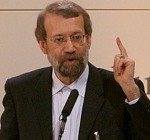The Speaker of the Iranian Islamic Consultative Assembly (Majles), Ali Larijani, will soon visit India to discuss bilateral ties. He is expected to meet President Pranab Mukherjee, Prime Minister Manmohan Singh and other officials. Larijani’s visit indicates the importance that all competing political forces of the Islamic Republic give to friendly ties with India.
Larijani, who is likely to contest the Presidential election in June 2013, is a significant persona in the fierce power politics of Iran. His importance goes beyond his present role in the Majles; he is one of the most powerful figures on the national political stage, and has been in leadership positions since the revolution in 1979.
A philosopher by training, Ali Larijani started his career as the head of the Islamic Republic of Iran Broadcasting; he has held a number of other key positions – as Minister of Islamic Guidance and Culture and a former member of the Islamic Revolutionary Guards Corps.
The Larijani family has been a key component of the ruling elite of Iran for decades. The five Larijani brothers, from a family of clerics and revolutionaries, serve in key positions in all three branches of the state – the judiciary, legislature and executive. The Larijanis were early participants in the revolution and the family’s influence is embedded in the Islamic Republic.
Ali Larijani has now emerged as a serious rival to President Mahmoud Ahmadinejad’s influence. Although he insists that he has no intention of running for the 2013 presidential election, speculation is high that he will be one of the presidential candidates chosen by Supreme Leader Ali Khamenei.
Larijani was also regarded as a serious contender in the 2005 presidential election. But he only got 5.9% of the vote, putting him at the bottom of the list. Although he is a capable and well-connected politician, loyal to the values of the Islamic Republic, Larijani’s popularity has been limited as evidenced by his inability to bring in the votes.
Even though his loss in the 2005 election was a setback for him, Ali Larijani remained a key figure as the secretary of the Supreme National Council, Iran’s top nuclear envoy, and the speaker of the Majles. Now, Ali Larijani is considered a strong rival to Ahmadinejad in domestic and foreign affairs.
Despite his reputation as a hardliner who is close to Khamenei, the West regards Larijani as a moderate who has demonstrated a more pragmatic approach to nuclear negotiations than Ahmadinejad. Using his role at the Majles, Larijani has frequently questioned Ahmadinejad’s policies, while his brother Ayatollah Sadegh Larijani, the head of the judiciary, has imprisoned Ahmadinejad’s aides charged with corruption and defiance of the Supreme Leader.
Ahmadinejad is still strong, but has lost popularity mainly due to the crackdowns on the Green Movement and because of Iran’s debilitated economy. Ali Larijani blames mismanagement by the government for the majority of Iran’s economic problems.
Besides, even with all the support that Ahmadinejad has received from the hardliner ruling elite, he was never considered an insider. Unlike most high-profile Iranian politicians, he does not share family and financial ties with the ruling families of the Islamic Republic like the Larijani brothers. Now that his tenure is coming to an end after two consecutive terms as president, this elite is determined to hold on to power in the executive, legislative and judicial spheres and keep away “outsiders” like Ahmadinejad.
As the presidential election of June 2013 comes closer, tensions will escalate among the hardliners who support Ahmadinejad and those who have politically lined up with the ruling elite including Khamenei and the Larijanis. Khamenei will do everything in his power to ensure a smooth election this time around and avoid a repeat of three years ago, when the Green Movement threatened the rule of the Islamic Republic.
But even an election without the leaders of the Green Movement, who remain under house arrest, will witness fierce competition among the hardliners, now divided as never before.
Regardless of Ali Larijani’s fortunes in the 2013 election, he and his family are likely to remain an integral part of the politically prominent upper crust, determined to hold on to power in the Islamic Republic.
Ali Larijani may be visiting India not only in his capacity as Speaker of the Majles, but also as a key strategist of the Islamic Republic and a messenger of Khamenei. It is possible that Khamenei is waiting for Ahmadinejad to leave office before he and his trusted officials present further plans for Iran’s nuclear programme. U.S.-led sanctions against a nuclear Iran have been tightened, creating an economic slump in the country. To push through any policy changes in the post-Ahmedinijad Iran, the ruling elite will need the support of countries like India which are significant buyers of Iranian oil and sympathetic to its dilemmas vis-a-vis the West.
Azadeh Pourzand is a Senior Researcher at Gateway House: Indian Council on Global Relations.
This article was exclusively written for Gateway House: Indian Council on Global Relations. You can read more exclusive content here.
For interview requests with the author, or for permission to republish, please contact outreach@gatewayhouse.in.
© Copyright 2012 Gateway House: Indian Council on Global Relations. All rights reserved. Any unauthorized copying or reproduction is strictly prohibited.


